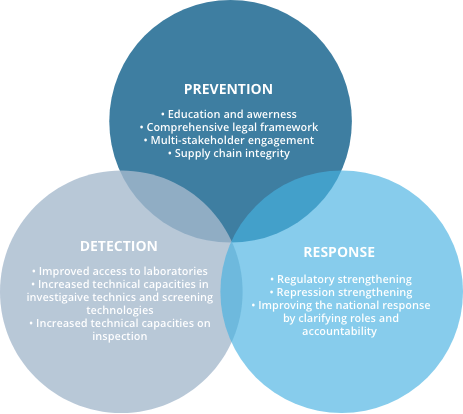
MEDISAFE’s key objective is to help combat the production and trafficking of falsified medicines in 11 countries in Eastern and Central Africa: Burundi, Democratic Republic of the Congo, Ethiopia, Ghana, Kenya, Malawi, Rwanda, Seychelles, Tanzania, Uganda and Zambia. In doing so, the project will contribute to fighting against organized crime and to improving health outcomes in the region.

The project will adopt two main strategies to reach these objectives:
The consortium’s strategy to combat falsified medicines is based on the WHO’s recommendations, relying on the three-pronged approach of prevention, detection and response:

Work package 1
Awareness raising
Increased public and stakeholder awareness of the risks related to the use of falsified medicines and pharmaceutical products and prevention/detection techniques.
Work package 2
Legal framework
Promotion of the adoption of comprehensive and harmonized legislation and regulations which criminalize the production, storage, transportation and sale of falsified medicines and pharmaceutical products.
Work package 3
Capacity building
Improved technical capabilities to help partner countries identify falsified medicines and address the challenges they pose.
Work package 4
Interagency cooperation
Fostering trust amongst public sector entities and private sector entities (for example, pharmaceutical companies) leading to enhanced formal and informal inter-agency cooperation.
Work package 5
International cooperation
Improved cooperation with regional and international organizations working in the area of falsified medicines, allowing the results achieved by other projects conducted in the region to be capitalized on.
Work package 6
Security of the pharmaceutical supply chain
Increased security of physical pharmacies, informal points of sale and online/internet sales.
The implementation of this strategic action plan will work to reduce the use and dissemination of falsified medicines, as per the WHO’s recommended three-pronged approach of prevention, detection and response:
– Education and awareness (WP1), comprehensive legal framework (WP2), multi stakeholder engagement (WP4 & WP5), and supply chain integrity (WP6) are key for PREVENTION.
– Access to laboratories and screening technologies (WP3), inspection (WP3), border control and reporting systems (WP5) will enhance DETECTION capabilities.
– RESPONSE is reinforced with regulatory strengthening (WP3), evidence based policy and operating procedures, and transparent legal procedures (WP2 & WP3).
The consortium is jointly developing a tailored solution alongside local and regional stakeholders, with the participation of institutions in its partner countries. For the solution to be successfully implemented, specific training and targeted activities have been organized to ensure that local actors not only adopt the solution, but that they do so sustainably.
Action plan